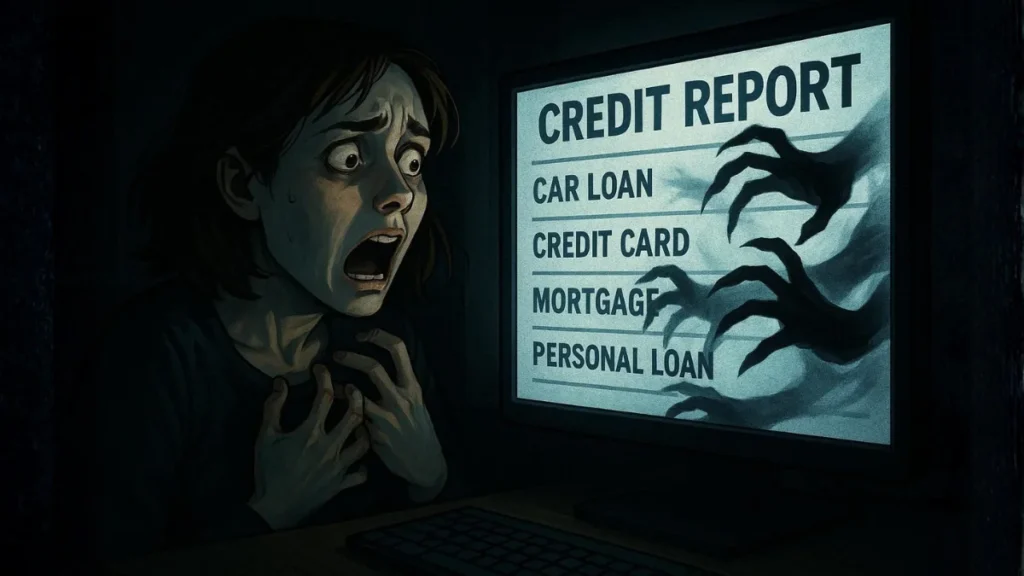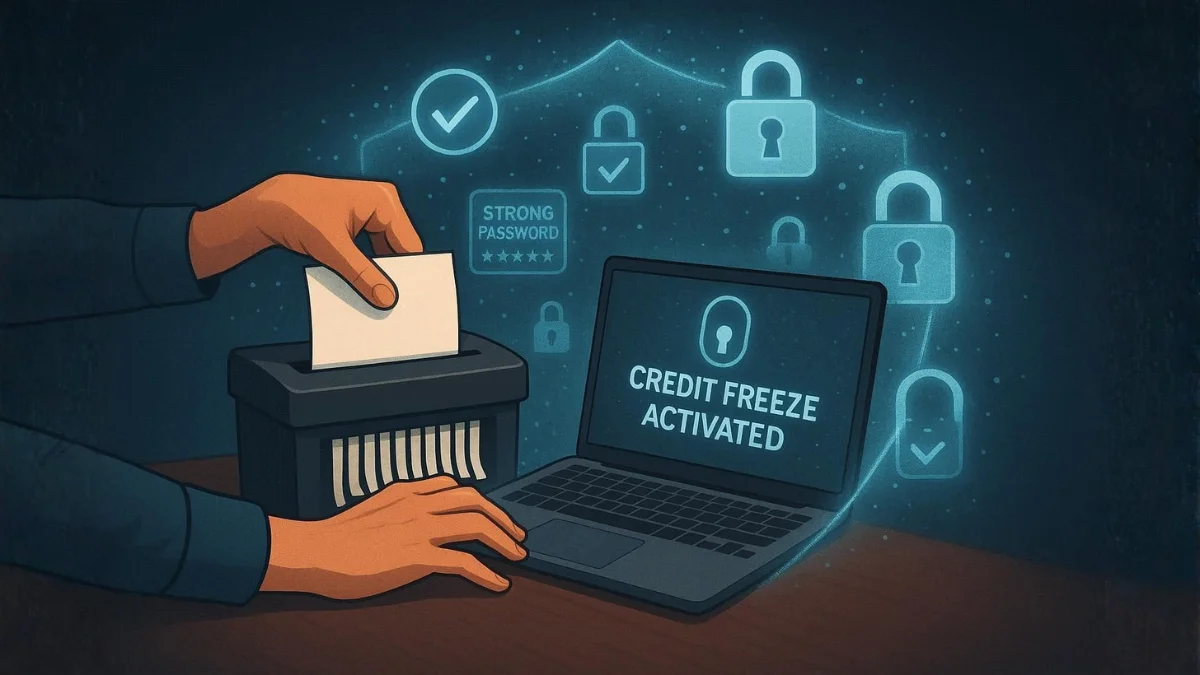Sarah Martinez checked her credit score on a Tuesday morning. Her stomach dropped. Seven credit cards she never opened. A car loan for a vehicle she never bought. $47,000 in debt that wasn’t hers.
She was 34 years old. She had good credit. She paid her bills on time.
None of that mattered anymore.
Your Name Is Their Weapon
Identity theft victims lose more than money. They lose years of their lives fighting ghosts. Criminals don’t just steal your Social Security number. They become you. They sign leases. They take out loans. They commit crimes under your name.
Meanwhile, you discover the theft months later. Sometimes years later. By then, the damage spreads like poison through your financial veins.
The numbers tell a horror story. Identity theft victims reported losses of $52 billion in 2023. That’s not a typo. Fifty-two billion dollars. Moreover, those are just the reported cases. Many victims never report the crime. They feel ashamed. They feel stupid. They suffer in silence.
The Predator’s Playbook
Thieves hunt for data everywhere. They dig through trash bins at night. They hack into company databases. They pose as bank representatives on the phone. Furthermore, they buy stolen information on the dark web for pennies.
Your Social Security number costs $4. Your credit card details go for $10. Your entire identity—name, address, birth date, Social Security number, mother’s maiden name—sells for less than $50.
That’s what you’re worth to them. A quick sale. Easy money.
They don’t see you as human. You’re inventory. You’re product. You’re profit.
How They Destroy You
First, they gather your information. Then, they test it. They make small purchases to see if the card works. Next, they go bigger. Credit cards. Auto loans. Mortgages.
The truly evil ones file tax returns in your name. They steal your refund before you can file. The IRS comes after you for fraud. You have to prove you didn’t steal from yourself.
James Richardson learned this the hard way. He was 52, a construction foreman in Ohio. Someone filed a tax return using his information. The IRS flagged his real return as fraudulent. He spent 18 months proving his identity. He lost $8,200 in legal fees. His stress caused health problems. His blood pressure spiked. His marriage nearly collapsed.
“I felt violated,” James said. “Like someone broke into my soul.”

The Invisible Scars
Identity theft victims face consequences that never end. Banks close their accounts. Credit card companies reject their applications. Landlords won’t rent to them. Employers run background checks and see criminal records that aren’t theirs.
Some victims spend 200 hours trying to fix the damage. That’s five full weeks of work. Others spend years. The Federal Trade Commission received 1.1 million identity theft reports in 2023 alone. Each report represents a person whose life got hijacked.
Additionally, the emotional toll crushes people. Victims experience anxiety and depression. They stop trusting anyone. They check their credit scores obsessively. They wake up at 3 AM, wondering what else got stolen.
Sleep becomes impossible. Peace becomes a memory.
Where They Strike
Criminals target everyone, but some groups suffer more. Indeed, people over 60 lose the most money per incident. They average $9,175 in losses. Young adults get hit most frequently. They check their credit less often. They don’t notice the theft until major damage occurs.
Healthcare facilities provide rich hunting grounds. Medical identity theft affects 2.5 million Americans each year. Thieves use stolen health insurance to get surgeries, prescriptions, and treatments. Your medical records get mixed with theirs. Your insurance maxes out on procedures you never had.
Imagine needing emergency surgery. The hospital refuses because your benefits are exhausted. You never used them. Someone else did. But proving that takes time you don’t have.
The Recovery Nightmare
Fixing identity theft drains your soul. First, you file police reports. However, many departments won’t help unless you have substantial evidence. Then, you contact credit bureaus. You dispute every fraudulent item. Each dispute requires documentation.
You call banks. You call creditors. You explain your situation dozens of times. Most representatives don’t care. They follow scripts. They transfer you. You wait on hold for hours.
Furthermore, collection agencies harass you for debts you didn’t create. They threaten lawsuits. They damage your credit further. Proving your innocence becomes your full-time job. A job that pays nothing. A job that costs everything.
The average identity theft victim spends $1,400 out of pocket. That includes legal fees, lost wages, and phone bills. Many lose much more.

The System Fails You
Banks and credit card companies claim they protect you. They promise fraud detection. They tout zero liability policies.
Those promises crumble when you need them most. Credit card companies investigate fraud for 90 days. Meanwhile, late fees pile up. Interest compounds. Your credit score plummets. Collection agencies buy your debt. They come after you harder than the original creditor.
Credit bureaus operate differently. They make money selling your data. When identity theft victims request fraud alerts, some bureaus drag their feet. They profit from data flowing freely. Your security conflicts with their business model.
They’re Watching You Right Now
Data breaches happen constantly. Hospitals, retailers, government agencies—all leak your information. Hackers stole 422 million records in the first half of 2024 alone. Your data sits in multiple breaches right now. You just don’t know which ones yet.
Every app you download requests permissions. Every website you visit plants cookies. Every form you fill out captures data. Companies sell your information legally. They call it “consumer insights” or “marketing partnerships.”
But data doesn’t stay secure. Eventually, it leaks. Then, criminals buy it. Then they become you.
The Future Gets Darker
Artificial intelligence makes identity theft easier. Deepfake technology can clone your voice from a three-second recording. Criminals call your parents pretending to be you. They claim they’re in trouble. They need money wired immediately.
Your parents hear your voice. They recognize your speech patterns. They send the money. You knew nothing about it until later.
Consequently, the old rules don’t work anymore. Checking your credit report isn’t enough. Monitoring bank statements isn’t enough. The thieves evolve faster than the defenses.

What You Must Do Now
Act before you become another statistic. Freeze your credit with all three bureaus today. It’s free. It stops criminals from opening new accounts in your name. Moreover, use unique passwords for every account. Enable two-factor authentication everywhere possible.
Check your credit reports every four months. Rotate through the three bureaus. Look for accounts you don’t recognize. Review every detail. Question everything suspicious.
Shred documents with personal information. Never throw away bank statements or credit card offers whole. Thieves still dig through trash. It still works.
The Theft Never Stops
Identity theft victims never fully recover. Even after fixing everything, the fear remains. Every strange charge triggers panic. Every denied transaction feels like another attack. The paranoia becomes part of you.
Sarah Martinez eventually cleared most of the fraudulent debt. It took three years. She still checks her credit weekly. She still jumps when her phone rings. The theft changed her permanently.
“I’ll never feel safe again,” she said. “They took more than money. They took my peace.”
James Richardson got his name cleared with the IRS. But he can’t forget those 18 months of hell. He can’t unsee what the system put him through.
These victims did nothing wrong. They didn’t fall for obvious scams. They simply existed in a world where criminals constantly hunted. Where your identity has market value. Where you’re prey, whether you know it or not.
The Hunters Are Patient
Right now, someone might be gathering your information. They’re waiting for the right moment. They’re building a profile. They’re learning everything about you.
They know where you bank. They know where you shop. They see your patterns. They exploit your habits.
When they strike, you won’t see it coming. You’ll discover the damage later. Much later. After they’ve already taken everything.
Your identity isn’t just yours anymore. It’s merchandise. It’s currency. It’s waiting to be stolen.
The silent theft continues. The predators hunt. The system fails. And identity theft victims multiply every single day.
Are you next?
Citations
[1] Federal Trade Commission. “Consumer Sentinel Network Data Book 2023.” February 2024.
[2] Identity Theft Resource Center. “2024 Data Breach Report.” July 2024.
[4] Federal Bureau of Investigation. “Internet Crime Report 2023.” March 2024.
[5] FTC: Medical Identity Theft FAQs for Health Care Providers and Health Plans
Related reading(suggested)
Grandparent Scams: ‘Grandma, I Need Bail Money’ Frauds
IRS Tax Scams: Inside the Fake Agent Terror Campaign
The Government Voice That Wants to Destroy You: Inside Social Security Scam Scripts









